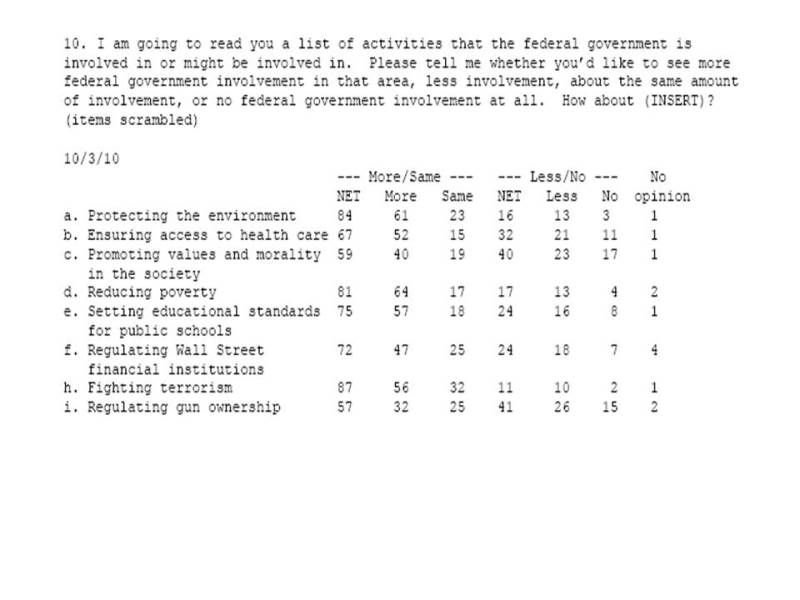Unsubtle Contradictory Statements
This goes beyond "who oh why don't we have a better press corps" and "top reporters are innumerate" to "top reporters are illiterate too"
Jon Cohen and Dan Balz report on a Washington Post poll in the Washington Post.They [most Americans] want Washington to be involved in schools and to help reduce poverty. Nearly half want the government to maintain a role in regulating health care.
If true, their claim would imply that many Americans want Washington to have no role in fighting poverty -- a very very radical position not yet advocated by any of the Republican loons running for office. It would also imply that more than half either want to eliminate the FDA or don't know if it should be eliminated.
However, their claim of fact about the Washington Post poll is false.
The actual questions are two clicks away from the "interpretation" (one has to click through a page of graphs and more analysis to get to the brute and raw plain facts of the matter).
The relevant question in the actual poll

As far as I can guess, Cohen and Balz read "Insuring access to health care" as
"regulating health care." If my guess as to what in the poll gave them that idea is correct, they are illiterate. The FDA does not "[i]nsure access to health care" but it does regulate health care.
The plain English meaning of the quoted passage from the article allegedly reporting the results of the poll is that a more than half of Americans answered "no federal governement involvement at all" or "no opinion" to the question on health care. In fact 11% answered "no federal government involvement at all" and 1% had no opinion. Cohen and Balz assert 12>50. In fact 52%, an absolute majority (52%) said they would "like to see
more federal government involvement in that area" More not "maintain a role" and 52 is more than half not "almost half." The claim in the article is plainly false and should be corrected.
64% wanted the Federal Government to be
more involved in "reducing poverty"
64%. 94% wanted the Federal government to have some role. 94% is technically a majority, but so is 64%. It is not normal to describe a 94% majority just as "most Americans" and a making an extremely weak claim when one could make a vastly more informative true claim with four more letters is strange enough to be deceptive.
Clearly Jon Cohen and Dan Balz are either lying or they don't grasp the difference betweeen supporting "to be involved" and "maintain a role" on the one hand and to "
more federal government involvement" and "" on the other. This is beyond innuracy. Basically it means that two top Washington Post reporters are functionally illiterate or deliberately lying.
I am going to bend over backwards to be charitable. Here I assume that
that 52 % is roughly "almost half" and that "most" is a reasonable word for 94% but not for 64% (the use of "most" had lead to many invalid arguments as to prove that something is true of most one needs to prove only that it is true of amajority, but then many go on to assume that "mos"t means "approximately all" so 50.1% is approximately all). Finally I assume tha writing "a majority" ... "more involved" which would be actually informative and plainly true for any definition of "most" was impossible because it would require 9 more keystrokes which is just too much for the subtle destinction between more effort to fight poverty and no effort to fight poverty.
With those very generous assumptions, the article still contains a falsehood. The reason is that the fraction supporting a role for the federal government in health care (and in particular in insuring access) is not "almost half" or "about half" or "slightly more than half" or "52%" but rather 88%.
My first guess was this was innumeracy so extreme that the difference between "more" and "any" is considered negligible. However, re-reading the article, I notice a huge number of quotations of people who say the federal government has recently done too much.
The conclusion of the article is "not all americans are Tea partiers," yet the case is understated to an extent which makes the article fundmamentally false. I think that the problem is that the poll results have a clear liberal bias, so describing the poll accuately would be unballanced.
However, facts are facts and the Washington Post must correct the falsehoods it published if it is to be considered a resectable newspaper.
I read the article but was not upset until the excellent Steve Benen quoted the questions as reported rather then the questions that were actually asked. Benen was not impressed by the respondents
writing "There's a reason our discourse isn't more constructive."
Heh indeed. And more than one reason. Part of the problem is newspaper articles which make false assertions like this one. I think that one huge failure of US journalism is a failure to report accurately the opinions of the US public on egalitarianism, poverty, economic policy and so forth. On economic issues, the US public is way to the left of the US public as reported by the elite media.
